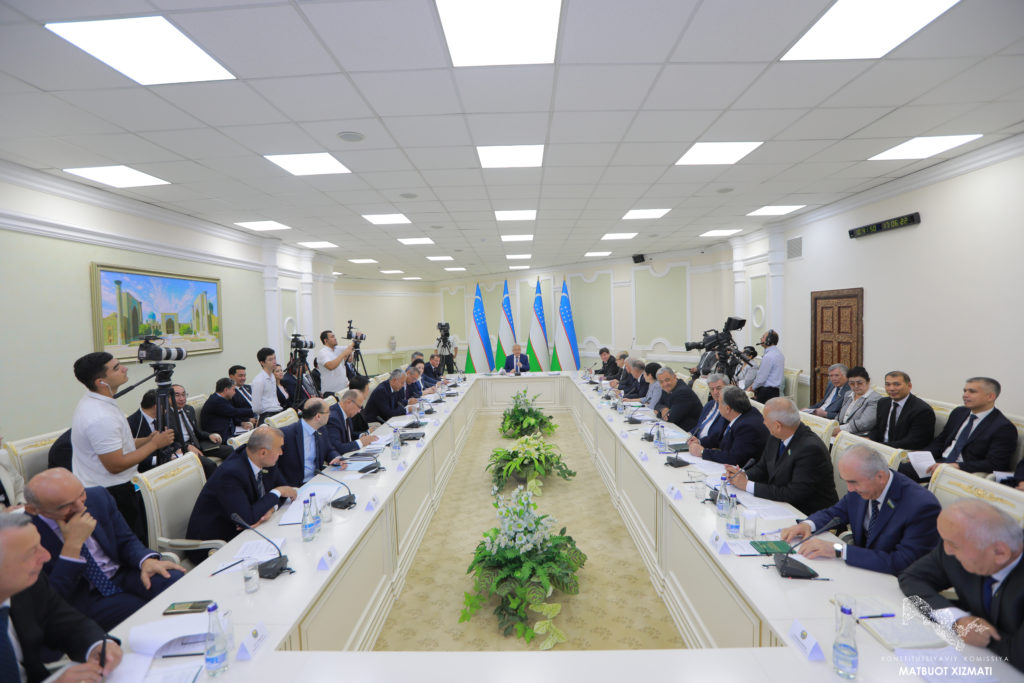
NEW UZBEKISTAN SEEKS CONSTITUTIONAL REFORMS
On May 20, 2022 the Constitutional Commission was established to develop proposals for constitutional amendments as part of a “New Uzbekistan” image refit.
This Constitutional Commission is comprised of deputies and senators from all regions, representatives from various social strata, civil society institutions, leading lawyers, political scientists, and other experts (47 people in total).
Uzbekistan has a long history of implementing constitutional reforms. 32 amendments and additions to 21 articles of the Constitution were made 7 times as part of the implementation of the tasks of the Action Strategy in five priority areas between 2017–2021.
They concerned, in particular, the activities of the parliament, government and the President, strengthening the independence and development of the judiciary, the system of checks and balances between the branches of government, the democratisation of the electoral system and the Mahalla.
During the presidential elections of Uzbekistan in October 2021 an important proposal was put forward to transform Uzbekistan’s democracy – the implementation of constitutional reform.
The first proposal to consider constitutional amendments and additions was made by voters during a meeting with UzLiDeP presidential candidate Shavkat Mirziyoyev in the Karakalpakstan district of Bozatau. The priority directions of constitutional reforms were outlined in President Shavkat Mirziyoyev’s fundamental book, “New Uzbekistan Development Strategy,” raising democratic reforms to a fundamentally different level.
Several areas of constitutional reform were identified as priorities: (1) the change of the paradigm “state – society – person” to a new one: “person – society – state”; (2) the provision of human interests in the process of economic reforms; (3) constitutional consolidation of the role and status of civil society institutions with the principle “Society is the initiator of reforms”; (4) the definition of the constitutional foundations for the development of the institution of the family and traditional human values; (5) a state youth policy with comprehensive support for youth; (6) reforming the principle that “New Uzbekistan is a social state” with a just society; (7) improving human rights including preventing child labor and protecting those with disabilities or from the older generation; (8) new environmental provisions linked to global climate change; and (9) the development of kindergartens, schools, higher education and science, which are interrelated components of the basis of the “Third Renaissance”.
As such, the Uzbek Parliament determined that the Constitutional Commission should be responsible for developing suitable proposals and draft laws and engaging experts to interpret statistical data and documents from among various state bodies and organisations. The commission will also monitor violations of the new constitutional rights and engage the relevant departments.
The Constitutional Commission is expect to follow a number of important principles including those of transparency and accountability. In performing this role the Press Service of the Constitutional Commission will provide in simple and understandable language the needs, priorities and main directions of constitutional reforms. Additionally, collegiality will be practiced – all members of the Constitutional Commission have a single vote and equal decision-making rights. Finally, the President’s idea that “the people are the creators of the law” is to be implemented through widespread participation of civil society institutions, academic, research, and analytical centres in the Constitutional Commission’s activities.
To date the Commission has received more than 45 thousand proposals from citizens, organizations, educational and academic societies. The most important issues raised regard: human rights issues; activity of high state bodies (government, parliament, judiciary); local authority; ecological issues; social welfare; civil society institutions (mass media, public control); gender issues; international relations; cultural heritage.
President Mirziyoyev at the meeting with the members of the Commission on June 20 proposed the adoption of amendments through a referendum to take into account the opinion of the population and its initiatives as much as possible. The President also emphasised the priority of reflecting in new Constitution additional guarantees for ensuring interests, freedoms and dignity of people as well as securing the principles of a social state – the idea of “Uzbekistan is a social state”.
In conclusion, the constitutional reforms will undoubtedly serve to implement the tasks of further improving the well-being of the population and the prosperity of the country, strengthening its economic power and competitiveness in the world.
Prof. Akmal Saidov,
Chairman of the Commission
for Constitutional Reforms in Uzbekistan,
First Deputy Speaker of the Legislative Chamber of
the Oliy Majlis (Parliament) of Uzbekistan,
Director of the National Centre of the Republic of Uzbekistan
for Human Rights
